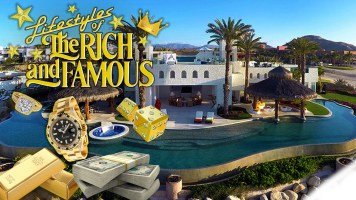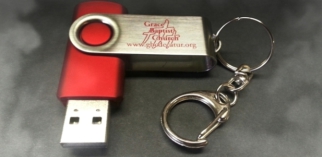Microsoft Word document [39.5 KB]
Lifestyles of the Rich and Famous
Ephesians 1:1-3
Rich - you are a joint heir with Christ!
Famous - your name is written in heaven, and great cloud of witnesses cheers you on from the grandstands of heaven!
That TV program focused on temporal things. The Bible focuses on eternity and things of lasting value. It's a good thing we can't choose what family we are born into, for our nature would choose a rich family...and sadly, we've seen how those kids turn out!
In Luke 16 Jesus tells us of a rich man and Lazarus, who begged for crumbs which fell from his table, with dogs licking his sores. And then they both die and we see them in eternity, and who is the beggar now? One is lavishly rich [Lazarus], and now the rich man is a beggar with nothing.
When we look at life, we must have eternity in view to fully understand. If you are saved, you are rich and famous in the courts of heaven!
2 Corinthians 8:9
For ye know the grace of our Lord Jesus Christ, that, though he was rich, yet for your sakes he became poor, that ye through his poverty might be rich.
1 Corinthians 1:5
That in every thing ye are enriched by him,
Your name is written in heaven, so you are also famous!
ill.--Hetty Green: 1800s Heiress of a whaling fortune, she inherited 7.5 million dollars from her father [over $100 million in today's money]. When she heard that her aunt willed $2 million to charity, she challenged it in court, producing a previous will which said the money would go to her, and that no subsequent wills would be valid. The court ruled that she had forged the papers. She never turned on the heat nor used hot water. She wore one old black dress and undergarments that she changed only after they had been worn out. She did not wash her hands and rode an old carriage. She ate mostly pies that cost fifteen cents. One tale claims that she spent half a night searching her carriage for a lost stamp worth two cents. Another asserts that she instructed her laundress to wash only the dirtiest parts of her dresses (the hems) to save money on soap.
Green conducted much of her business at the offices of the Seaboard National Bank in New York, surrounded by trunks and suitcases full of her papers; she did not want to pay rent for an office. Rumours claimed that she ate only oatmeal, heated on the office radiator. She was given the nickname the "Witch of Wall Street".
The City of New York came to Hetty in need of loans to keep the city afloat on several occasions. She would travel thousands of miles – alone, in an era when few women would dare travel unescorted – to collect a debt of a few hundred dollars.
Her frugality extended to family life. Her son Ned broke his leg as a child, and Hetty tried to have him admitted in a free clinic for the poor. Found out, she never had it properly treated, and it was eventually amputated.
You and I are rich in Christ, and yet we live like spiritual paupers.
1. The Glorious Introduction.
v. 1 This is the normal way Paul would begin a letter. So what is so glorious about this introduction?
It's the writer! He wasn't always Paul. He began as Saul, persecutor of the church, hater of Christians, and blasphemer of Jesus Christ. He had dedicated his life to stamping out the name of Jesus. But on the road one day, he saw the light, smitten in the dust of conviction. The power of the gospel changed his life, as it did a restless demoniac in Mark 5, a woman of ill repute in John 4, a cold hearted jailer in Acts 16. And in Acts 9, this bloodthirsty persecutor became an apostle.
ill.--a 37 year old lawyer in St. Louis was an alcoholic, and one day one of his clients, Tom McFetters, walked in and said, "I'm the biggest coward in town." "Why would you say that?" "Because I've been doing business with you for a year and haven't asked you the question on my mind." "What's that?" "Why aren't you a Christian?" He hung his head and said, "Doesn't the Bible say that no drunkard can inherit the kingdom of God?" "I didn't ask you that. I asked, why aren't you a Christian?" He showed him many verses from the Bible, and pleaded with the lawyer to be saved. And get saved he did, and later testified that it was powerful, and the chains of sin were broken, never to be forged again. His name was C. I. Scofield, and today you and I have the benefit of the Scofield reference Bible because of it!
It's the readers! The Ephesian believers. This book was written to saints. [not ain'ts] And so, this book was written to you and me! "I'm not a saint, you can ask my wife!" Positionally in Christ, we are saints. It means set apart, set aside for God. Like the pots and pans in the Jewish temple, they were holy vessels, set apart only for God's use.
The Catholic church has ruined the term saint by indicating that we can posthumously declare someone a saint, like they were some super Christian. But man cannot declare man a saint...only God can! And this letter we now study wasn't written to a bunch of dead people in a European graveyard, but to saints like you and me today! And we are in the ranks of the rich and famous!
2. The Gracious Salutation.
v. 2 Paul walked in two worlds. One was Jewish, and one was Gentile. In the Gentile world, the common greeting on the street was 'charis' [hello] which means 'grace.' But when he saw a Jew, he would say 'shalom' which means peace. And God's hello to the human heart is grace and peace. It's more than just something you say. And the grace of God leads to the peace of God.
Romans 5:1
Therefore being justified by faith, we have peace with God through our Lord Jesus Christ:
In the 1700s, a slave trader would sail from England to Africa, herding blacks into cages, murdering any who resist, tearing children from parents. His Christian mother all the while prayed for him. He was saved, and John Newton went on to write Amazing Grace.
The Christian life commences in grace, continues in grace, and will conclude in grace at the end of this life. Dying grace is real, but you won't experience it 'til you need it.
ill.--Dr. Bob Gray was on a flight that seemed to be going down. Everyone prepared their hearts as the plane nose dived toward the ground. At the last minute it pulled up and they were ok. Someone later asked him, since he preached dying grace, if he was scared. He said yes. "Did you think you were going to die?" "No chance. I knew I wouldn't die." "How did you know?" "Because the Bible says we'll have dying grace and I didn't have it!"
v. 7 This means we are rich!
3. The Grateful Benediction.
v. 3 We are blessed physically in this nation, no matter who we are, and we should thank God for that, and remember that it may not always be so. But this is about spiritual blessings, and I don't think we know just how rich we really are.
What do you possess which money cannot buy and death cannot take away?
The TV show revealed all their cars, houses, yachts, etc...but didn't show how miserable these folks are.
ill.--Elvis Presley had it all and said, "I suppose I'm the most miserable man on the earth."
ill.--Howard Hughes had more money than could be spent in a dozen lifetimes and died alone a hermit, living on soda crackers.
It's ok for us to 'like' the things money can buy, but we must 'love' the things money cannot buy. Money can buy a house, but not a home; a bed, but not a good night's sleep; food, but not an appetite.
Which spiritual blessings does v. 3 say we possess? ALL of them! We'll get more specific in coming weeks.
For now, how are we going to appropriate all this is in our account?
There's 2 ways we can approach the blessings referred to in this verse:
2 true stories illustrate:
A wealthy shipbuilder in England died and left 8 million dollars to 2 men. One didn't believe it could be true. He was last seen on Chicago's skid row, homeless...a wino. He died that way.
The other was living somewhere in the Western US. Agents were dispatched to find him. They gave him the good news, and an advance on his fortune. He took the money and bought a new suit, cleaned up, and boarded a first class flight to go and claim his full inheritance.
We can approach v. 3 either way. We can read about these spiritual blessings and turn away and go home unchanged, or we can perk up and make a decision to do what it takes to appropriate it!


